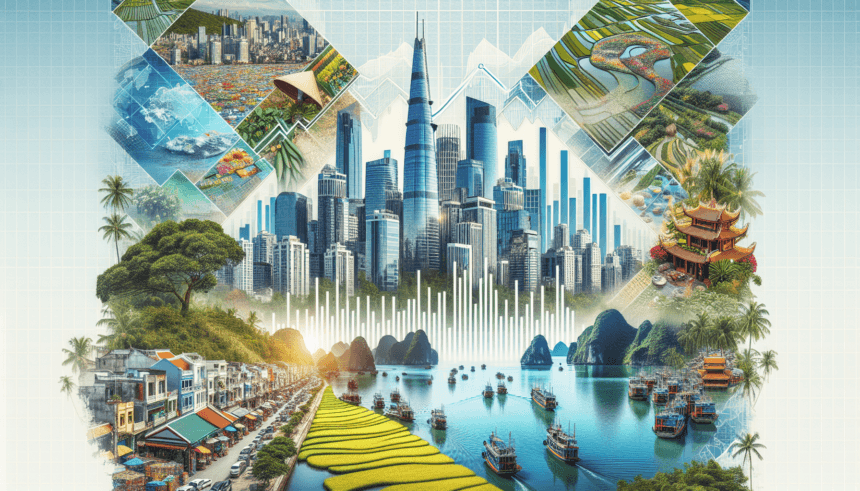Main Points In Hindi (मुख्य बातें – हिंदी में)
वियतनाम – विकास पथ में एक सफलता की कहानी: डब्ल्यूबी उपराष्ट्रपति – मुख्य बिंदु
-
आर्थिक विकास की सफलता: विश्व बैंक के उपाध्यक्ष मैनुएला वी. फेरो ने वियतनाम को एक सफलता की कहानी बताया, जहां पिछले 40 वर्षों में पारिवारिक आय में छह गुना बढ़ोतरी हुई है और अत्यधिक गरीबी लगभग समाप्त हो गई है।
-
निर्यात बढ़ाने की रणनीति: वियतनाम सरकार के द्वारा अर्थव्यवस्था को खोलने और निर्यात को प्राथमिकता देने के फैसले ने महत्वपूर्ण मोड़ दिया। आज, निर्यात देश के सकल घरेलू उत्पाद का लगभग आधा हिस्सा है।
-
कुशल श्रम शक्ति और कम ऊर्जा लागत: वियतनाम की आर्थिक वृद्धि की एक प्रमुख वजह है इसकी प्रचुर और सस्ती श्रम शक्ति और कम ऊर्जा लागत, जिससे उच्च मूल्य वर्धित गतिविधियों को बढ़ावा मिला है।
-
2045 तक उच्च आय वाला देश बनने का लक्ष्य: वियतनाम ने 2045 तक उच्च आय वाला देश बनने का महत्वाकांक्षी लक्ष्य निर्धारित किया है, जिसमें घरेलू फर्मों की अंतरराष्ट्रीय कंपनियों के साथ एकीकरण और सेवा क्षेत्र के विकास पर ध्यान केंद्रित करने की आवश्यकता है।
- जलवायु परिवर्तन और सतत विकास: वियतनाम में ऊर्जा क्षेत्र CO2 उत्सर्जन का एक प्रमुख स्रोत है। इसके लिए आवश्यक है कि देश जलवायु-अनुकूल तकनीकों के साथ निरंतर विकास के अपने लक्ष्यों को संरेखित करे, ताकि इसे 2045 के विकास लक्ष्यों को प्राप्त किया जा सके।
Main Points In English(मुख्य बातें – अंग्रेज़ी में)
Here are 5 main points from the discussion with Manuela V. Ferro, Vice President of the World Bank for East Asia and the Pacific, regarding Vietnam’s development journey:


-
Remarkable Economic Growth: Vietnam has transformed dramatically over the past 40 years, achieving a sixfold increase in household income and nearly eliminating extreme poverty. This success is attributed to opening its economy in the 1980s and prioritizing export production.
-
Role of Foreign Investment and Labor: The country has attracted significant foreign investments, leveraging its abundant and low-cost labor force. This has facilitated economic expansion and the engagement of a substantial part of its workforce in export activities.
-
Goals for Future Development: Vietnam aims to become a high-income country by 2045, which requires advancing its value chains and integrating domestic firms with productive foreign companies. There is a strong emphasis on enhancing service sectors and undergoing significant decarbonization in energy production.
-
World Bank Support: The World Bank has partnered with Vietnam since 1978, providing financial assistance and policy advice that has supported the country’s recovery and growth, particularly in education and infrastructure.
- Climate Change and Agricultural Innovations: Vietnam is facing climate change challenges, and the government is working towards decarbonizing the economy. Innovations in agriculture, such as low-emission rice farming, are also leading to increased yields and reduced environmental impact, positioning Vietnam as a potential leader in agricultural technology.
Complete News In Hindi(पूरी खबर – हिंदी में)
वियतनाम – विकास पथ में एक सफलता की कहानी: डब्ल्यूबी उपराष्ट्रपति
विश्व बैंक (डब्ल्यूबी) के पूर्वी एशिया और प्रशांत क्षेत्र के उपाध्यक्ष मैनुएला वी. फेरो ने वियतनाम को आर्थिक विकास के मामले में एक सफलता की कहानी बताया क्योंकि इसने आर्थिक परिदृश्य को नाटकीय रूप से बदल दिया है, और महत्वपूर्ण विदेशी को आकर्षित करते हुए पारिवारिक आय को छह गुना बढ़ाने की असाधारण उपलब्धि हासिल की है। पिछले 40 वर्षों में निवेश।
उन्होंने 21 नवंबर को वियतनाम समाचार एजेंसी के साथ एक विशेष साक्षात्कार के दौरान यह बयान दिया।
रिपोर्टर: वियतनाम ने पिछले दशकों में उल्लेखनीय विकास और गरीबी में कमी का अनुभव किया है। इस तीव्र परिवर्तन में प्रमुख कारक क्या थे?
मैनुएला वी. फेरो: वियतनाम की विकास यात्रा एक उल्लेखनीय सफलता की कहानी है। 40 वर्षों में पारिवारिक आय छह गुना बढ़ गई, जिससे अत्यधिक गरीबी लगभग समाप्त हो गई। वियतनाम एक गतिशील, आधुनिक अर्थव्यवस्था के रूप में खड़ा है जिसने बड़े विदेशी निवेश को आकर्षित किया है।
यहां के लोगों के लचीलेपन और दृढ़ संकल्प ने महत्वपूर्ण भूमिका निभाई। 1980 के दशक में अर्थव्यवस्था को खोलने और निर्यात को प्राथमिकता देने का सरकार का साहसिक कदम एक महत्वपूर्ण मोड़ था। आज, निर्यात सकल घरेलू उत्पाद में लगभग आधा योगदान देता है, और हर दो में से एक कर्मचारी निर्यात क्षेत्र में काम करता है।
वियतनाम की अब तक की वृद्धि में एक प्रमुख कारक प्रचुर और कम लागत वाली श्रम शक्ति है और दूसरा तत्व कम ऊर्जा लागत है। इन कारकों ने न केवल विकास और उच्च आय में अनुवाद किया, बल्कि अंतिम असेंबली और जीडीपी की उच्च कार्बन तीव्रता जैसी कम मूल्य वर्धित गतिविधियों में लगे श्रम बल के एक महत्वपूर्ण हिस्से को भी प्रेरित किया।
रिपोर्टर: वियतनाम ने 2045 तक उच्च आय वाला देश बनने का महत्वाकांक्षी लक्ष्य निर्धारित किया है। इस लक्ष्य को प्राप्त करने के लिए क्या आवश्यक है और डब्ल्यूबी कैसे योगदान दे सकता है?
मैनुएला वी. फेरो: 2045 तक उच्च आय वाला देश बनने के अपने लक्ष्य को प्राप्त करने के लिए, वियतनाम को मूल्य श्रृंखला को आगे बढ़ाने और घरेलू फर्मों को उत्पादक विदेशी फर्मों के साथ एकीकृत करने पर ध्यान केंद्रित करना चाहिए। सेवा क्षेत्र में विकास के एक अतिरिक्त इंजन के रूप में काम करने की क्षमता है, खासकर अगर यह निवेश और अधिक प्रतिस्पर्धा के लिए खुला है।
प्रतिस्पर्धात्मकता बढ़ाने और सकल घरेलू उत्पाद के कार्बन पदचिह्न को कम करने के लिए, विशेष रूप से ऊर्जा क्षेत्र में, डीकार्बोनाइजेशन महत्वपूर्ण होगा। उच्च कुशल श्रम शक्ति में निवेश, विशेष रूप से इंजीनियरिंग और अन्य एसटीईएम क्षेत्रों में, नौकरियों को स्वचालन से बचाने और उत्पादन को उच्च मूल्य वर्धित गतिविधियों की ओर ले जाने के लिए महत्वपूर्ण होगा।
डब्ल्यूबी की रिपोर्ट “वियतनाम 2045: बदलती दुनिया में व्यापार में वृद्धि – उच्च आय वाले भविष्य के रास्ते” रणनीतिक विकल्पों और रास्तों की रूपरेखा प्रस्तुत करती है। भविष्य की योजना के लिए सरकार का खुलापन एक सकारात्मक संकेत है, और हम वियतनाम की संभावनाओं के बारे में आशावादी हैं।
हमने 1978 से वियतनाम के साथ साझेदारी की है, सबसे पहले सबसे गरीब देशों के लिए डब्ल्यूबी के फंड, अंतर्राष्ट्रीय विकास सहायता (आईडीए) के माध्यम से। हमें इस बात पर गर्व है कि हमने वियतनाम को युद्धोपरांत पुनर्प्राप्ति से लेकर आज की मध्यम-आय स्थिति तक, शिक्षा और महत्वपूर्ण बुनियादी ढांचे में निवेश के साथ-साथ नीतिगत सलाह के साथ समर्थन दिया है, जिससे अधिक आर्थिक गतिशीलता और नौकरियां पैदा करने में मदद मिली।
वियतनाम अब विकास के एक अलग चरण पर है। बाहरी और घरेलू संदर्भ बदल गए हैं। उन्हें वियतनाम की नई अर्थव्यवस्था में सक्रिय और चुस्त नीति निर्माण और निवेश की आवश्यकता है। विश्व बैंक की ओर से, हम परिवहन, डिजिटलीकरण, जलवायु लचीलापन और कृषि उत्पादकता में परिवर्तनकारी निवेश को वित्तपोषित करने के लिए तैयार हैं जो वियतनाम को 2045 में उच्च आय का दर्जा प्राप्त करने के अपने लक्ष्य को प्राप्त करने में मदद कर सकता है।
रिपोर्टर: अपनी यात्रा के दौरान, आप उन किसानों और कृषि व्यवसायों से बात करने के लिए मेकांग डेल्टा गए, जिन्हें डब्ल्यूबी द्वारा वित्तपोषित वियतनाम सतत कृषि परिवर्तन परियोजना से लाभ हुआ है। तुमने वहां क्या देखा?
मैनुएला वी. फेरो: अपनी यात्रा के दौरान, मैंने देखा कि कैसे मेकांग डेल्टा के किसानों ने कृषि प्रौद्योगिकियों का एक अभिनव पैकेज अपनाया जो चावल की खेती में क्रांति ला रहा है। इस विधि से पैदावार बढ़ती है, कीटनाशकों और उर्वरकों का उपयोग कम होता है और किसानों की आय 30% तक बढ़ जाती है। यह विधि मीथेन उत्सर्जन में भी कटौती करती है, जो जलवायु परिवर्तन में महत्वपूर्ण योगदानकर्ता है। आधुनिक सिंचाई में निवेश से अतिरिक्त फसलें उगाने, कुछ को निर्यात करने और आय के अतिरिक्त स्रोत उत्पन्न करने की भी अनुमति मिलती है।
मैंने किसानों, सहकारी समितियों और कृषि व्यवसायों से सुना कि वे अपने परिचालन का विस्तार करने को लेकर कितने उत्साहित थे। हम इस दृष्टिकोण के लक्ष्य को 1 मिलियन हेक्टेयर तक विस्तारित करने में मदद करने के इच्छुक हैं, जिसकी घोषणा प्रधान मंत्री ने की थी। कृषि नवाचार में वियतनाम का नेतृत्व उल्लेखनीय है और इसकी नकल अन्यत्र भी की जा रही है।
रिपोर्टर: वियतनामी सरकार ने न केवल कृषि क्षेत्र, बल्कि पूरी अर्थव्यवस्था को डीकार्बोनाइज करने का प्रयास किया है। तो आप इन प्रयासों के बारे में क्या सोचते हैं?
मैनुएला वी. फेरो: वियतनाम में ऊर्जा क्षेत्र CO2 उत्सर्जन का एक प्रमुख स्रोत है। लागत कम रखते हुए इसे डीकार्बोनाइज करना आवश्यक है। जैसे-जैसे वैश्विक बाज़ार गंदी ऊर्जा से उत्पादित वस्तुओं की तुलना में स्वच्छ ऊर्जा से उत्पादित वस्तुओं को प्राथमिकता देने लगे हैं, वियतनाम के बड़े निर्यात क्षेत्र को अनुकूलन की आवश्यकता है। देश को परिवहन और कृषि, विशेषकर चावल की खेती और पशुधन की सफाई करनी चाहिए।
जलवायु परिवर्तन पहले से ही वियतनाम को प्रभावित कर रहा है, जिसमें लवणीकरण, अधिक बार बाढ़ और तटीय विनाश शामिल हैं। वियतनाम के महत्वाकांक्षी लक्ष्यों को पूरा करने के लिए निरंतर विकास को जलवायु-अनुकूल प्रौद्योगिकियों के साथ संरेखित करना होगा।
रिपोर्टर: सबसे गरीबों के लिए डब्ल्यूबी फंड, आईडीए, को दो सप्ताह में कोरिया गणराज्य (आरओके) में भर दिया जाएगा। आईडीए से वियतनाम को कैसे लाभ हुआ और अन्य विकासशील देश वियतनाम के प्रक्षेप पथ से क्या सीख सकते हैं?
मैनुएला वी. फेरो: हां, कोरिया गणराज्य दिसंबर की शुरुआत में आईडीए की 21वीं पुनःपूर्ति की मेजबानी कर रहा है। देश का विकास अनुभव दिखाता है कि सक्रिय और दूरदर्शी विकास नीति और आईडीए जैसे बाहरी भागीदारों के समर्थन से क्या संभव है। आरओके और वियतनाम के बीच कुछ समानताएं हैं, दोनों देश युद्ध के बाद की तबाही से तेजी से विकास की ओर बढ़ रहे हैं।
हर तीन साल में, हम दुनिया के सबसे गरीब देशों को कम ब्याज और लंबी परिपक्वता वाले ऋणों का समर्थन करने के लिए आईडीए की भरपाई करते हैं। आरओके, अपने विकास में आईडीए की भूमिका के लिए आभारी है, इस दौर की मेजबानी कर रहा है और पहले ही आईडीए में अपने योगदान में 45% की वृद्धि की घोषणा कर चुका है। वियतनाम ने भी कई दशकों में आईडीए से प्राप्त 18 बिलियन अमेरिकी डॉलर का बुद्धिमानीपूर्वक उपयोग किया है। इस क्षेत्र और दुनिया भर के कई देशों को अभी भी आईडीए समर्थन की आवश्यकता है।
रिपोर्टर: आप वियतनामी दर्शकों को क्या संदेश देना चाहेंगे?
मैनुएला वी. फेरो: वियतनामी लोगों के दृढ़ संकल्प और ताकत को देखना प्रेरणादायक है। अपने देश की प्रगति में योगदान देना न केवल एक खुशी है, बल्कि एक विशेषाधिकार है, और हम 2045 तक आपको उच्च आय का दर्जा हासिल करने में मदद करने के इच्छुक हैं।
रिपोर्टर: धन्यवाद!।/।
Complete News In English(पूरी खबर – अंग्रेज़ी में)
The World Bank’s Vice President for East Asia and the Pacific, Manuela V. Ferro, has described Vietnam as a success story in economic development. She noted that the country has dramatically transformed its economic landscape and achieved extraordinary results, increasing household incomes sixfold and attracting significant foreign investment over the past 40 years.
She made this statement during an exclusive interview with the Vietnam News Agency on November 21.
Reporter: Vietnam has experienced remarkable growth and a reduction in poverty over the last few decades. What have been the key factors in this rapid transformation?
Manuela V. Ferro: Vietnam’s development journey is an impressive success story. In 40 years, household incomes have increased sixfold, which nearly eliminated extreme poverty. Vietnam is recognized as a dynamic, modern economy that has attracted significant foreign investment.
The resilience and determination of the people here have played a vital role. The government’s bold step to open the economy in the 1980s and prioritize exports was a critical turning point. Today, exports contribute nearly half to GDP, and one in two workers is employed in the export sector.
A key factor in Vietnam’s growth so far has been its abundant and low-cost labor force, along with low energy costs. These elements have not only translated into development and higher incomes but have also encouraged a significant portion of the workforce engaged in lower value-added activities such as final assembly and high carbon intensity GDP.
Reporter: Vietnam has set an ambitious goal of becoming a high-income country by 2045. What is needed to achieve this goal, and how can the WB contribute?
Manuela V. Ferro: To achieve its goal of becoming a high-income country by 2045, Vietnam needs to focus on upgrading its value chains and integrating domestic firms with productive foreign firms. The service sector can act as an additional engine for growth, especially if it remains open to investment and increased competition.
To enhance competitiveness and reduce GDP’s carbon footprint—especially in the energy sector—decarbonization will be crucial. Investing in a highly skilled workforce, especially in engineering and other STEM fields, will be essential to preserving jobs from automation and shifting production towards higher value-added activities.
The WB’s report, “Vietnam 2045: Growing Business in a Changing World – Pathways to a High-Income Future,” outlines strategic options and pathways. The government’s openness to future planning is a positive sign, and we are optimistic about Vietnam’s possibilities.
We have partnered with Vietnam since 1978, initially through the World Bank’s fund for the poorest countries, the International Development Association (IDA). We take pride in having supported Vietnam from its post-war recovery to its current middle-income status, through investments in education and critical infrastructure along with policy advice, helping to create more economic mobility and jobs.
Vietnam’s economic growth has been significantly driven by its abundant and low-cost labor force. (Photo: VNA)
Vietnam is now at a different stage of development. Both external and domestic contexts have changed. There is a need for active and agile policy-making and investment in Vietnam’s new economy. From the World Bank’s side, we are ready to fund transformative investments in transport, digitization, climate resilience, and agricultural productivity, which can help Vietnam achieve its goal of high-income status by 2045.
Reporter: During your visit, you went to the Mekong Delta to talk to farmers and agri-businesses benefiting from the WB-funded Vietnam Sustainable Agricultural Transformation Project. What did you observe there?
Manuela V. Ferro: During my visit, I saw how farmers in the Mekong Delta adopted an innovative package of agricultural technologies that is revolutionizing rice cultivation. This method increases yield, reduces the use of pesticides and fertilizers, and boosts farmers’ incomes by up to 30%. It also cuts methane emissions, a significant contributor to climate change. Investment in modern irrigation allows for growing additional crops, some of which can be exported, generating extra income.
I heard from farmers, cooperatives, and agri-businesses about how excited they were to expand their operations. We are keen to help extend this approach to 1 million hectares, as announced by the Prime Minister. Vietnam’s leadership in agricultural innovation is remarkable and is being replicated elsewhere.
Reporter: The Vietnamese government is making efforts to decarbonize not just the agriculture sector, but the whole economy. What are your thoughts on these efforts?
Manuela V. Ferro: The energy sector in Vietnam is a major source of CO2 emissions. It is essential to decarbonize it while keeping costs low. As global markets increasingly prioritize goods produced from clean energy over those from dirty energy, Vietnam’s large export sector needs to adapt. The country must focus on cleaning up transportation and agriculture, particularly rice farming and livestock.
Climate change is already affecting Vietnam, with salinization, more frequent flooding, and coastal destruction. Ongoing development must align with climate-friendly technologies to meet Vietnam’s ambitious targets.
Reporter: The IDA fund for the poorest will be replenished in two weeks in South Korea. How has IDA benefited Vietnam, and what can other developing countries learn from Vietnam’s trajectory?
Manuela V. Ferro: Yes, South Korea will host the 21st replenishment of IDA in early December. The country’s development experience shows what is possible with proactive and visionary development policies and support from external partners like IDA. There are some similarities between South Korea and Vietnam, both of which have made rapid strides from post-war devastation to development.
Every three years, we replenish IDA to support the world’s poorest countries with low-interest loans and long maturities. Korea, grateful for the role of IDA in its development, is hosting this replenishment and has already announced a 45% increase in its contribution to IDA. Vietnam has also wisely used the $18 billion it has received from IDA over several decades. Many countries in this region and globally still need IDA support.
Reporter: What message would you like to convey to the Vietnamese audience?
Manuela V. Ferro: It is inspiring to see the determination and strength of the Vietnamese people. Contributing to the progress of your country is not just a joy but a privilege as we are eager to help you achieve high-income status by 2045.
Reporter: Thank you!










